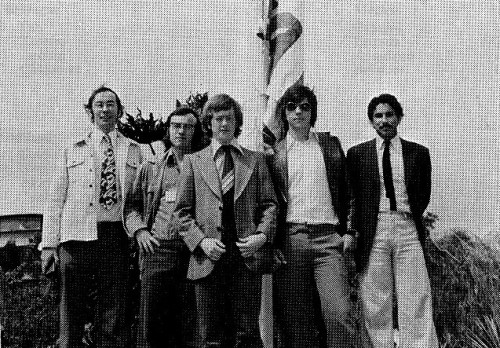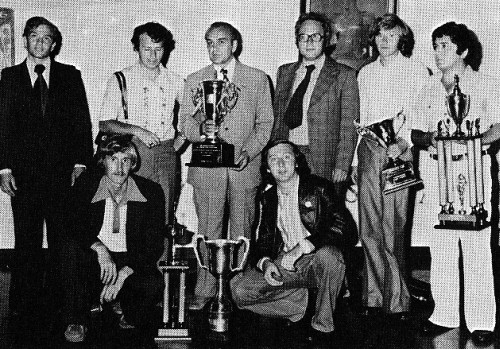The world chess championships for student teams have taken place regularly since 1954. They are among the most important competitions held by the International Chess Federation (FIDE) and are organized in cooperation with the IUS, on whose initiative they were first established.
With the exception of 1973 and 1975 these championships have been held every year. In 1973 the championship was supposed to take place in Ecuador, but the organizers called it off because of internal problems only three months before it was to begin, and it was not possible to arrange for it to be held in any other country on such short notice. Last year, none of the member countries of FIDE were able to ensure its holding.
This most popular of student chess competitions took place this year for the twenty-first time. It was held from August 7—22 in Caracas, the capital of Venezuela. For the second time in the history of this world championship, the venue was the Western hemisphere.
 While in 1971, in Mayaguez, Puerto Rico, only 16 teams participated in the championship, this year 21 teams from all over the world came to Caracas. There were fewer participants from Europe than usual; representation was limited to five teams (USSR, Poland, Switzerland, Scotland and Iceland). On the other hand, there was a pleasing number of participants from Asia. The majority of the participants however, came from Latin America and the Caribbean, and the fact that this championship was held in Caracas undoubtedly contributed to the further popularization and development of chess in Latin America. The teams from Nicaragua, Jamaica and Panama were present at this world championship of student teams for the first time. The Soviet students, who were the defending world champions, once again displayed their strength in Caracas and emerged easy winners leading the other teams by many points. This marked the sixteenth time that the Soviet students had won the gold medal as world champions. They have only been outplayed five times: in 1954 and 1963 the students from Czechoslovakia emerged victorious, in 1960 and 1970 the US students won the title, and in 1959 the Bulgarian students came first.
While in 1971, in Mayaguez, Puerto Rico, only 16 teams participated in the championship, this year 21 teams from all over the world came to Caracas. There were fewer participants from Europe than usual; representation was limited to five teams (USSR, Poland, Switzerland, Scotland and Iceland). On the other hand, there was a pleasing number of participants from Asia. The majority of the participants however, came from Latin America and the Caribbean, and the fact that this championship was held in Caracas undoubtedly contributed to the further popularization and development of chess in Latin America. The teams from Nicaragua, Jamaica and Panama were present at this world championship of student teams for the first time. The Soviet students, who were the defending world champions, once again displayed their strength in Caracas and emerged easy winners leading the other teams by many points. This marked the sixteenth time that the Soviet students had won the gold medal as world champions. They have only been outplayed five times: in 1954 and 1963 the students from Czechoslovakia emerged victorious, in 1960 and 1970 the US students won the title, and in 1959 the Bulgarian students came first.
The Soviet student team included outstanding chess players, some of whom are already well-known internationally. Hence it was not surprising that all of them obtained the best individual results on their chessboards.
 In group A, Romanishin came first on the 1st chessboard, Vaganian on the 2nd, Beliavsky on the 3rd and Sveshnikov on the 4th. Among the first substitutes, Palatnik from the USSR and Regan, a very young US student, achieved the best results. Among the second substitutes, the junior world champion, Tchekhov from the USSR, was the most successful. Second place, the silver medal, was successfully defended by the US students, who were led by the experienced international grandmaster J. Kaplan.
In group A, Romanishin came first on the 1st chessboard, Vaganian on the 2nd, Beliavsky on the 3rd and Sveshnikov on the 4th. Among the first substitutes, Palatnik from the USSR and Regan, a very young US student, achieved the best results. Among the second substitutes, the junior world champion, Tchekhov from the USSR, was the most successful. Second place, the silver medal, was successfully defended by the US students, who were led by the experienced international grandmaster J. Kaplan.
The championship was also a great victory for the Cuban students, who placed third and won the bronze medal. At the last championship in Teesside in 1974 Cuba was 11th.
 The Swiss students were also very successful, coming 4th in the final standings. They had a well-balanced team led by the former junior world champion and present international grandmaster Werner Hug. At the last championship, held in England, they had come 16th, and thus they went up twelve places. But it should be remembered that many strong teams from Europe — among them those from Hungary, England, the FRG, Yugoslavia, Denmark, Finland, the Netherlands and Czechoslovakia — were not competing in this year's championship.
The Swiss students were also very successful, coming 4th in the final standings. They had a well-balanced team led by the former junior world champion and present international grandmaster Werner Hug. At the last championship, held in England, they had come 16th, and thus they went up twelve places. But it should be remembered that many strong teams from Europe — among them those from Hungary, England, the FRG, Yugoslavia, Denmark, Finland, the Netherlands and Czechoslovakia — were not competing in this year's championship.
While the 6th place gained by the Polish students could only be considered a mediocre standing, the teams from Brazil and Venezuela, the host country, did very well.
 The competition in final group B for the 9th to the 16th places was very fierce and ended in a surprise, with the Iranian students emerging victors. They had not participated in the previous championship in Teesside, but in 1972, in Graz, Austria, they had only come 23rd. Their 9th place thus represented a remarkable improvement and a great success for the Iranian students, who were led by the international grandmaster Sharif The students from Iraq were also quite successful. In 1974 in England they had finished last, in 28th place, while in Caracas they came 14th. This success of the Iraqi students reflects the growing popularity of chess in the Arab countries in recent years, and at the same time the improved standards of the chess players from that region.
The competition in final group B for the 9th to the 16th places was very fierce and ended in a surprise, with the Iranian students emerging victors. They had not participated in the previous championship in Teesside, but in 1972, in Graz, Austria, they had only come 23rd. Their 9th place thus represented a remarkable improvement and a great success for the Iranian students, who were led by the international grandmaster Sharif The students from Iraq were also quite successful. In 1974 in England they had finished last, in 28th place, while in Caracas they came 14th. This success of the Iraqi students reflects the growing popularity of chess in the Arab countries in recent years, and at the same time the improved standards of the chess players from that region.
The best individual result in final group B was that of Sinclair, the leading player on the Scottish team. The 21 teams were divided into four groups. The first two teams in each group then competed in final group A, the third and fourth in each group went on to final group B, and the remaining five teams played in final group C. In the last group, the experienced team of students from Ecuador finished first; this country was participating in the championship for the fourth time. The Jamaican student Wheeler, was the best in final group C, obtaining 4½ points (including the games in the preliminary group) in 7 games, i.e. a score of 64.8 per cent.
 Even though competition was keen, the tournament took place in an atmosphere of good sportsmanship. As chief arbiter, I did not have to intervene and solve any important quarrels. All the participants in the championship should be thanked for this. We must also thank the organizers in Caracas, particularly the Venezuelan Chess Federation, which, with the effective support of the highest state officials and municipal organizations, created excellent conditions for the successful holding of the championship.
Even though competition was keen, the tournament took place in an atmosphere of good sportsmanship. As chief arbiter, I did not have to intervene and solve any important quarrels. All the participants in the championship should be thanked for this. We must also thank the organizers in Caracas, particularly the Venezuelan Chess Federation, which, with the effective support of the highest state officials and municipal organizations, created excellent conditions for the successful holding of the championship.
The championship attracted widespread interest among the public and the local press gave it extensive coverage.
The 21st World Chess Student Team Championship was a great success, both as a sports event and on the organizational level. It contributed to the development and consolidation of friendly ties among student chess players from all over the world. It also contributed to the popularization of chess not only in Venezuela, but in the other Latin American countries as well.
/ Ing. Jaroslav Šajtar, President of FIDE Zone 3 /